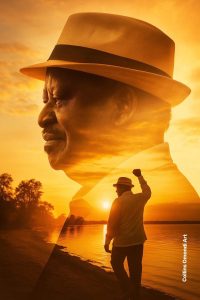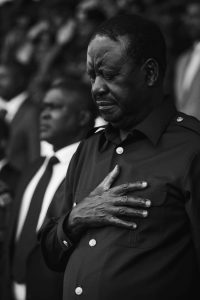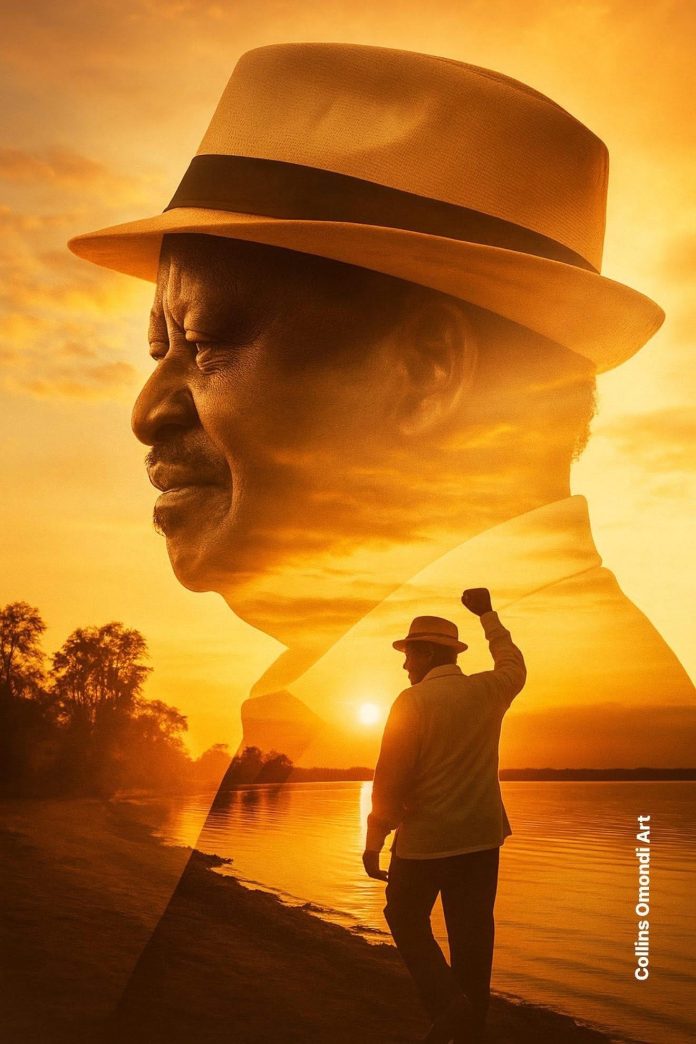From Struggle to Statesmanship
When Raila Amolo Odinga died in October 2025, Kenya did not just lose a politician; it lost a living chapter of its democratic story. For more than four decades, he was the face of defiance, resilience, and reconciliation. His departure leaves behind grief and a deep reflection on where Kenya’s politics go next.

Born in 1945 to Jaramogi Oginga Odinga, Kenya’s first Vice President, Raila’s life was shaped by politics and protest. Detained, exiled, and sidelined during the one-party era, he emerged as one of the boldest voices for multiparty democracy in the 1990s. His courage, conviction, and sometimes stubborn nature made him both a hero and a headache for the establishment.
From fiery opposition rallies to delicate coalition talks, Odinga mastered the art of political survival. He fought battles not just for power but for principles, free speech, justice, and fair elections. To many, he was “Baba,” a father figure whose words carried the moral weight of Kenya’s unfinished struggle for equality.
Moments That Defined His Legacy
2007 Election Crisis and the Coalition Era
After the deadly 2007–2008 post-election violence, Odinga entered a power-sharing government as Prime Minister. It was a controversial but necessary move that stabilized the country and paved the way for reforms.
2010 Constitution
Odinga’s influence is deeply embedded in Kenya’s 2010 Constitution. It delivered devolution, a stronger judiciary, and citizens’ rights, the foundations of a more accountable democracy.
2017 Election and Judicial Milestone
When the Supreme Court nullified the presidential election following Odinga’s petition, Kenya made history. It was the first time an African court overturned a presidential result. That moment showed his belief in institutions over individuals.
The Handshake and BBI
His 2018 handshake with President Uhuru Kenyatta eased national tensions and redefined politics around unity and dialogue. Critics saw betrayal; Odinga saw patriotism. The Building Bridges Initiative that followed sought to heal ethnic divides, even though it faced legal hurdles.
Teacher of Democracy and Free Speech
Raila Odinga did not just participate in democracy, he taught it. His lifelong commitment to freedom of expression placed him among global reformers such as Nelson Mandela, Aung San Suu Kyi, Lech Walesa, and Tsakhiagiin Elbegdorj.
Like Mandela, he chose reconciliation; like Walesa, he stood with the people; like Suu Kyi and Elbegdorj, he believed that dialogue and ideas were more powerful than fear.
He never occupied State House, yet his moral authority reached far beyond its walls.
The Man Behind the Myth

Few tributes capture Raila’s humanity better than David Osiany’s story from the 2023 Africa Climate Summit. When Odinga lacked an official invitation, Osiany took a personal risk to secure his entry, bluffing his way through protocol.
Raila laughed when told of the plan, teasing, “Inyalogi? Kare in be in mjanja?” (You managed it? So, you’re clever too?). As presidents arrived at KICC, cameras caught an uninvited Raila Odinga walking confidently into the VIP lounge, a scene that summed up his life: always finding his way to the table of power.
Osiany later wrote, “He was unwanted, but still my hero. Wuora inega , my father, your death has robbed me of a father.”
That loyalty mirrored the deep personal devotion he inspired in those around him.
Another touching reflection came from Pauline Njoroge (CEO Ebony Analytics and Political Strategist), who wrote that Odinga “was loved and hated in equal measure, but never misunderstood once you met him.” She recalled his humour, brilliance, and love for history, from African liberation struggles to European revolutions.
“He was deeply human, reflective, and always learning,” she said. “Never President, yet presidential in every sense. Never AU Chairperson, yet already Baba yetu wa Afrika.”
The Mourning of a Nation
Kenya has entered a season of mourning. In Kisumu, crowds fill the streets chanting “Jowi!” In Nairobi, thousands gather at Uhuru Park and Nyayo Stadium holding candles and waving flags. Across Mombasa, Eldoret, and Nakuru, churches, mosques, and temples have joined in prayer.
There is sorrow, but also celebration, of a man who refused to be silenced and who taught a generation that democracy is worth every scar. His home in Bondo has become a place of pilgrimage, where Kenyans come not only to mourn but to say thank you.
A Changing Political Landscape
Raila’s passing has altered Kenya’s political equation. The opposition is fragmented, and the balance of power is shifting. Younger leaders in ODM now face the difficult task of filling a void too large for one person.
Political analysts predict a period of realignment:
President William Ruto’s administration may consolidate or lose influence in the absence of Odinga’s moderating voice.
The opposition could splinter or reform under younger reformists who follow his ideals but forge their own paths.
Civil society and Gen Z activists might take up his torch, pushing democratic reform through digital movements rather than party politics.
Kenya now stands at a crossroads, a test of whether the freedoms Raila fought for can endure without his guiding hand.
The African Dreamer
Raila Odinga was more than a national leader; he was a Pan-African visionary. As the African Union’s High Representative for Infrastructure Development, he championed the LAPSSET Corridor, the Trans-African Highway, and other initiatives that aimed to unite the continent through trade and connectivity.
His final ambition, to chair the African Union Commission, reflected his lifelong dream, an Africa united by cooperation, opportunity, and shared destiny.
The Final Word
Raila Odinga’s life cannot be defined by elections alone. He was the protester in the crowd, the reformer in the cabinet, and the teacher in every conversation. He never sat in State House, but he shaped how Kenya thinks about power.
As the nation mourns, one question lingers: Can Kenya preserve the democracy he built without the man who built it?
Like Mandela, he forgave. Like Walesa, he stood firm. Like Suu Kyi and Elbegdorj, he believed words could be weapons for justice. Above all, he remained Baba, flawed, fearless, and unforgettable.
Kenya has lost a politician, but Africa has gained a legend.
Never crowned, yet forever king in the hearts of his people.
Jowi! Jowi! Jowi!




